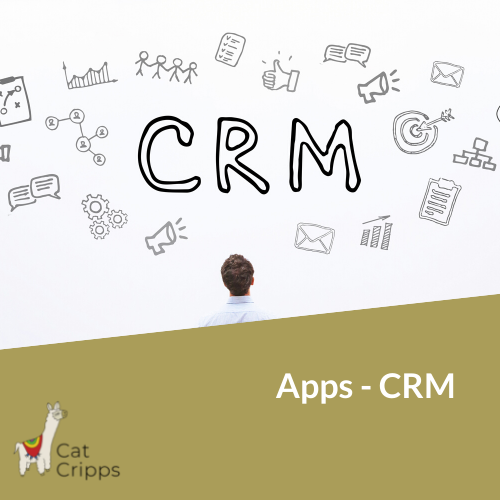I have been looking at various apps and how they can help you in business, together with some things you need to consider when selecting software for your business. I am covering 4 main areas:
1. Accounting
2. Customer Relationship Management – CRM
3. Project management/productivity/collaboration tools
4. Appointments / calendars
This time I’d like to look at CRM. This is a shortened version of a presentation I do frequently – 10 things to think about if you are considering CRM. It is also relevant if you are not yet considering it, but would like to see how it might benefit your business.
Here we go…
1. Who? Who’s in your organisation – not just you but associates and if you have an outsourced VA. Who needs access to key business information – or a subset of it? Choose a system where you can control who accesses it and at what level – and make sure you can quickly rescind access if you need to.
2. Where – well pretty much everyone works remotely at least some of the time now – it used to be quite rare – so access to company information is crucial – wherever they may be. This can be one of the main drivers for a business to seek a CRM.
3. Why? What will be the benefit to YOUR organisation of having a master database tracking all your interactions with contacts? Only you know the answer to this – make sure it fits with your overall business objectives.
4. Sales – do you need to track sales opportunities – a making sure you keep in touch, putting efforts into the right deals? Do you have a good sales process already – this is a great place to start before considering software.
5. Marketing – CRM is so much more than a glorified address book. What do you know about your current clients and how does that inform your ideal customer? When you are communicating can you make sure that you are sending the right information to the right people at the right time? Market segmentation is key to success in your marketing.
6. Customer Service – is your customer experience the best it can be – can you send out information to recent purchasers regarding how to get the most out of what they bought? If issues arise can you track and make sure you resolve them satisfactorily? And also start to measure where things are going wrong?
7. Training – if you invest in a CRM then make time (and maybe money) available for training for you and any other users – it will pay dividends – otherwise you will end up not using the system and not getting the best out of it
8. Third sector – charities will benefit from CRM systems too – and you don’t necessarily need the very expensive charity apps! Track donors, fundraisers, stakeholders and all your interations.
9. Time – take time to “Implement” your system properly. You can’t just start using it without proper preparation. Time spent setting it up at the start will be worth it.
10. What next – There are many “CRMs” – although all CRM systems work on similar principles, they can vary widely – as can the costs!! Take some time and ask lots of questions – ask the software vendor, consultants and / or business contacts who have had good (or not so good) experiences. But keep in mind your own goals for your business which may not align with others’.
As I said last time – If you have other apps you like to use then check out which of the above your app will link to – there might be a software app for your industry so make sure they connect! You might want to connect to your website for example.
You will get lots of responses if you ask for recommendations, as there are almost as many CRMs as there are stars in the sky – well almost! Hubspot is free and may be a good place to start.
Get in touch if you would like to discuss further.
